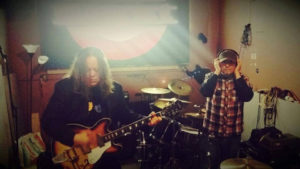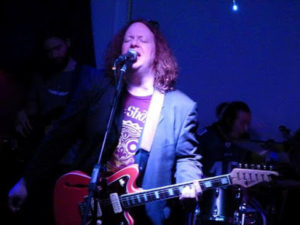With the release of the new album Therapy by the band Plasticsoul, Steven Wilson makes a fresh bid for the rock and roll heights. Featuring an array of solid riffs and ornate production, the album leads the listener through something that is very cohesive, yet individual song-by-song.
Popdose had the opportunity to speak to Wilson to find out why the album arrived almost eight years after the band’s previous one, what the themes behind the songs are, and why it’s okay to be a rock band again.
 It has been a while between Plasticsoul releases. What accounts for the gap between (I’m guessing) Peacock Swagger in 2009 and Therapy?
It has been a while between Plasticsoul releases. What accounts for the gap between (I’m guessing) Peacock Swagger in 2009 and Therapy?
We had started working on a follow up album a year or so after Peacock Swagger. We actually had come close to completing 4 or 5 songs. For some reason the songs just weren’t resonating with me so I scrapped them. Then our drummer at the time, Kevin Holden, moved to Washington state and we had to find his replacement, our current drummer Steve Markowitz. Steve has a very different drumming style than Kevin. I found myself writing more towards Steve’s strengths as a drummer.
It turned out that I was much happier with the material that I was generating working this way. We had another setback when the computer that I was using to record the new album crashed beyond repair. The hard drive that I was using to back up the album had managed to die as well. Fortunately, I had most of the basic tracks, vocals, and some overdubs saved to another computer. We basically had to redo about 50% of the album. Then I made the decision to mix the record myself (my first major mixing project) and that took about a year.
Therapy is not a concept album, but there seems (to me, at least) to be a thematic thread happening throughout. Is that real or misinterpretation? And if the former, what should listeners take away as that theme?
Before I answer that question I’m curious to know what you think the thematic thread of the record is
 To me, there seems to be the thread of escape or attempting to escape. It’s either in the sound, particularly when things go a bit exotic, or directly in the songs “My Heavy Soul” and “All Died Pretty.” There seems to be an overall sense of different narrators looking at where they are and wanting to be someplace else, either good or bad. That may be my crooked interpretation, but that’s what I got from the set as a whole.
To me, there seems to be the thread of escape or attempting to escape. It’s either in the sound, particularly when things go a bit exotic, or directly in the songs “My Heavy Soul” and “All Died Pretty.” There seems to be an overall sense of different narrators looking at where they are and wanting to be someplace else, either good or bad. That may be my crooked interpretation, but that’s what I got from the set as a whole.
It’s really interesting that you got that from the record. You are very close in several ways. Therapy actually started out as a concept record of sorts. It was going to be called “The Girl of Many Tribes” after the track of the same name. I wanted to write a series of breakup songs from the point of view of the guy in the relationship — and I didn’t want him to be a sympathetic character so I was visualizing him as somebody who deserved to be dumped. The girl of many tribes would be the heroine of the album.
It started to feel forced and too one dimensional. I also started writing songs like “The King of Hash” and “Therapy” that I really wanted to record but didn’t fit that theme. But there are definitely different narrators in some of those songs who don’t want to be in the place they are — either physically or mentally. Really wild that you picked up on that!
The album sounds ambitious. There are, of course, the rock songs with the trinity guitar/bass/drums, but there’s a lot more going on sonically throughout. Could you go into what was involved with putting it all together?
Peacock Swagger (the last Plasticsoul album) was very ambitious. For that album I was trying to write songs that spanned different genres but was cohesive and still sounded like Plasticsoul. With Therapy my goal was to make a more straight forward rock album.
At the same time I wanted to incorporate some of the production touches of Peacock Swagger into Therapy. Songs like “The Girl of Many Tribes” and “Babylon” are very lush and have much more ambitious production. While working on the album I actually referred to those two as ”the big production numbers” or the ”Bob Fosse tunes.” I also wanted to add a little bit of that production spice to the more rocking tunes like the backwards reverb on the opening drum fill of “King of Hash” and the sound effects on “Keeping a Light On.” I’m always excited when I hear weird little Sgt Peppery bits on other people’s records so I try to incorporate it here and there on my own stuff.
 You worked with Brandon Schott on a couple of songs on the record. How was he involved with Therapy?
You worked with Brandon Schott on a couple of songs on the record. How was he involved with Therapy?
I’ve known Brandon for about ten years. Maybe more. He did most of the fancy keyboard stuff and background vocals on Peacock Swagger as well. I’ve been on his last four (?) records playing guitar, bass, singing, etc. We’ve also recorded some cover songs together for various projects. He’s my go to guy when I’m stuck in a song or need some big flourish of sound to make the song bloom. Brandon always comes through with something brilliant. We work really well off of each other.
We also have a side project called The Courds. We’ve been threatening to make The Courds record for years now. We even have an albums worth of songs for it. Maybe one day it will come to fruition.
One of the things that frequently gets me thinking is the effect of “genre” on a musician, and I thought we could dig into that. My first impression when I put on Therapy was that it was a rock record, in a good way. I did not have a lot of extra tags to throw on top of that. But there are plenty of communities that support artists and bands — some of them create a specific box into which said artists are easily categorized, and it can be very difficult to break out of those preconceptions. (This is particularly true of metal, where fans will often react as betrayed when the formula is changed too much.)
Plasticsoul, to me, is not too concerned with being beholden to such rigid constraints. What has that meant for you as a songwriter? I’d think, on the one hand, it is liberating but, on the other, limiting because you can’t so clearly be pinned down. What’re your thoughts on this?
Funny that you should ask because I was just having a conversation about this with a friend the other day. I really hate being asked the question ”what type of music do you play”. My typical answer is ”rock music” because that’s what it is. This never seems to be a satisfactory answer for most people. I really don’t know what else to say. Plasticsoul has run the gamut as far as genres is concerned but it’s still just rock music to me. I certainly don’t find myself constrained by trying to fit in any particular box.
The only thing I think about when I’m writing a song is does it sound like a good song for Plasticsoul or not? I have lots of ”not Plasticsoul songs” that are written and may find their way on to other people’s albums in the future. Actually, Brandon Scott recorded one of those songs called “I Don’t Stack Up To You”. It’s supposed to be released on a duo/covers album he recorded with our friend Shana Dellos.
 The album is an independent release, with a digital version available on Bandcamp. What’s required of being an independent artist right now, particularly a rock-oriented independent artist?
The album is an independent release, with a digital version available on Bandcamp. What’s required of being an independent artist right now, particularly a rock-oriented independent artist?
Being an independent artist is all I’ve ever known. We have had a couple of offers from small labels in the past but they wanted too much in exchange for too little. It just seemed like a more logical decision to keep doing things ourselves. This means we have to get our CDs pressed, market it to the public, fulfill the orders, try to get it in the press (thanks Popdose!), etc. I would much rather spend this time and energy writing and recording new music.
On the other hand I would rather hold on to all of my publishing, maintain my creative freedom, and not owe anybody anything. If the right offer came around I would consider it, but for the time being I’m cool with keeping Plasticsoul an indie entity.
Interesting related story: I once had a conversation with the late great Jay Bennett from Wilco. It was 2008 and he was giving away his new album Whatever Happened I Apologize for free (with the option to donate) online. I asked him why he had decided to do this. He said that he had played on multiple albums that had sold well, toured the world, and was a fairly famous dude — yet he hadn’t earned more than about $150 from album sales. By giving his album away for free with the option to donate he had already made more money and was still getting his music out to the people.
I’ve always kept that story in the back on my mind and try to share with my fellow indie musicians — especially when I get the urge to start looking for a record deal.
It is a little easier to write and record, I’d imagine, if you were a one-man-band and had total control over the how-and-when of recording. But that’s not necessarily the case with Plasticsoul. Are you and the rest of the band in close proximity to each other, and what are the challenges of coming together to record?
I don’t think I would like being in a one man band very much. I really like to hear what other musicians contribute to my songs. Plasticsoul’s guitarist Daniel Conrad not only comes up with tasty riffs and solos, he is also a master of guitar tone. We don’t use any amp modelers or amp plugins — it’s all guitars, pedals, and amps. Tell Daniel what sort of tone you want, reference a classic record, he will make it happen. Steve Markowitz (drums) and Aaron Powell (new bass player) are a rock solid rhythm unit, great singers, and fun, uplifting guys to be around.
Left alone I’m full of self-doubt about every song I write, would never get anything done, and would sit around alone with my big ideas. We are all in or around the Los Angeles area so proximity is never really an issue. The biggest challenge we face being in a band is that we all have day jobs and families. Our drummer Steve works in television so he’s a busy guy with a sometimes rigid schedule. Even though we have busy lives outside of the band we all make time to get together to rehearse, gig, and record.





Comments